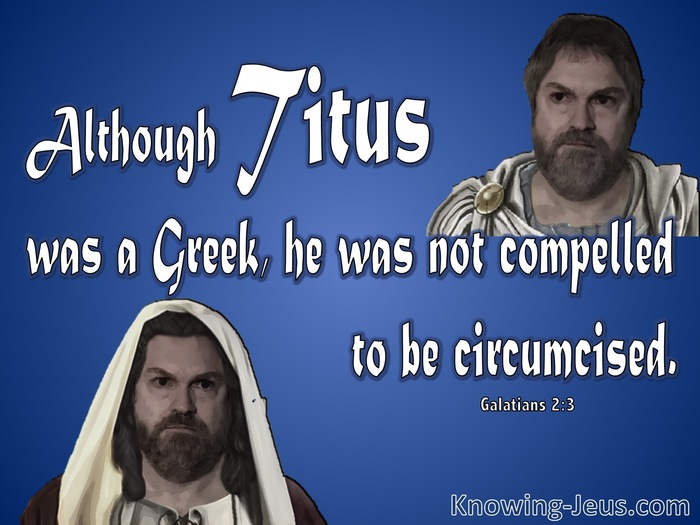◄ What Does Galatians 2:3 Mean? ►
But not even Titus, who was with me, though he was a Greek, was compelled to be circumcised.
Galatians 2:3(NASB)
Verse of the Day
The question of legalism was perhaps the most important issue in the early Church that needed to be addressed. Jews that were steeped in the Mosaic Law were prepared to add elements of Christianity to their Judaism by believing in Jesus for the forgiveness of sin, but they were not prepared to live by faith alone - preferring to revert back to the Law as they lived out their daily lives through works of the flesh. Foolishly, they chose to remain bound by the restrictions of the Mosaic Law (which were no longer in force) instead of rejoicing in their freedom in Christ, which was theirs by grace.
It was this issue that caused much dissension within the early Church and which resulted in the first apostolic conference being held in Jerusalem to address this issue. This was to be the forum whereby the apostles and early Church leaders were to hammer out the post-Cross, Church-age doctrine upon which the gospel of God was founded.
Paul had been teaching the gospel of grace, together with Barnabas and Titus who were his co-workers, but he was increasingly aware of the doctrinal rift that was building up between Jewish and Gentile believers. It was for this reason that Paul visited Jerusalem, where he spoke to the spiritual leaders of the Church about the gospel of grace - knowing that the message he taught was given to him by divine revelation.
Paul felt directed by God to travel to Jerusalem and present the gospel that he preached to both Jews and Gentiles. He laid out the truths that he had been teaching privately, before the Church elders there. Indeed, his faithful co-labourer, Titus, was someone who was right in the centre of this controversy on legalism, the Law, and the teachings of the newly founded Christian Church.
Titus was a Gentile convert who had been born again but who had not gone through the Jewish ritual of circumcision. It would be this particular issue that would prove to be one of the main topics under discussion - and one of the heresies that plagued the early Church.
Before the Cross, any Gentile proselytes to Judaism had to be circumcised and live under the Law. However, following Christ's sacrificial death and glorious Resurrection, there was no requirement for the circumcision of Gentile believers in Church age doctrine.
Paul and the other apostles, recognised that the law was a schoolmaster to point the apostate nation of Israel to their coming Messiah Who would save them from their sins, once they repented. From the beginning, the wages of sin for both Jew and Gentile alike has been death, and the shed blood of an innocent animal covered man's sin until the arrival of the true sacrifice for sin - Jesus Christ.
It was when the Saviour of the world came to live on earth as the Word made flesh, that He identified with man's sin and took the punishment for man's transgressions upon His own shoulders. Though the wages of sin is most certainly death, the gift of God is eternal life to all who believe in the sacrificial death and glorious Resurrection of Jesus Christ, God's only begotten Son.
Circumcision was not a condition of salvation following the Cross, and neither is water-baptism or any other additional requirements than to simply trust in the Person and work of the Lord Jesus Christ through Whom we are justified before God - through faith.
Part of Paul's presentation before the Jerusalem council was that "Not even Titus, who was with me, though he was a Greek, was compelled to be circumcised." Paul argued that the pre-Cross conditions of circumcision, which was the sign God gave to Israel to identify them as His covenanted people, did not apply to Titus when he was saved. He was an uncircumcised Greek who was not under the Law but under grace.
As a member of the post-Cross Church, there was no mandate for the practice of circumcision in the revelation Paul received from the Lord. Many in the early Church found it very difficult to recognise that there is a difference between the way God dealt with Israel, pre-Cross (through the conditional Law of Moses) and the post-Cross Church (through the unconditional 'Law of the Spirit of Life in Christ Jesus').
Although there are some similarities between pre-Cross and post-Cross doctrines, there are also significant differences. It is only when one recognises that God has a different programme for Israel from His agenda for the Christian Church, that many of the controversies which existed in the early Church, and continue to rage today, become clear.
One such difference is that pre-Cross saints did not have the permanently indwelling Holy Spirit, which is one of the graces that ALL post-Cross Christians enjoy... and circumcision of the flesh was another. Titus was a Gentile believer who was used as an example to the Jerusalem council, that Church-age believers are not under the Law but under grace.
May we strive to stay true to the liberating truth of the gospel of grace and not place ourselves back under the Law by trying to apply instructions that were given specifically to PRE-Cross Israel to point them to Christ. Rather, may we stand firm on the POST-Cross doctrines which were given to the Church and which are mainly found in Paul's epistles and the writings of the other apostles.
May we not confuse teachings given to Israel with teachings that are given to the Church. In the same way that we recognise ALL Scripture is given by inspiration of God and is profitable for doctrine, for reproof, for correction, and for instruction in righteousness so that we may be grounded in the truth of God's Word, may we also understand that although ALL Scripture is FOR us, not all doctrine is directed AT us - and we need to be discerning to recognise the difference.
My Prayer
Heavenly Father, thank You for the Word of Life and the truths that it contains. Lord, there is so much more that I need to understand about Your unique programme with Israel and Your agenda for the Church. Give me discernment to know which Scriptures are directed toward Israel and which ones are directed toward the Church. Help me to not become confused or bound up in legalism by trying to fulfil directives that were not given to believers in the Dispensation of Grace. Thank You, in Jesus' name, AMEN.
Choose a Verse from Galatians 2
Galatians 2:3 Further Study
- Galatians 2:3 in the Parallel Bible
- Galatians 2:3 in the Thematic Bible
- Galatians 2:3 Cross References
- Galatians 2:3 Treasury of Scripture Knowing
- Galatians 2:3 Sermons
- Galatians 2:3 Prayers
- Galatians 2:3 Images
- Choose Chapter
Never miss a post
















